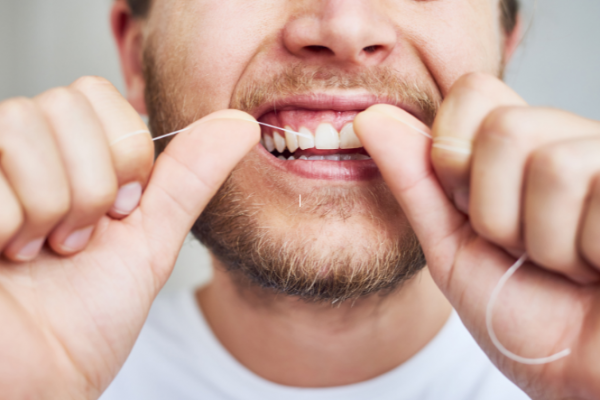Wishing everyone a safe and happy Christmas and New Year – Meri Kirihimete from the Healthify team.
Bad breath
Also known as halitosis
Key points about bad breath
- You may be aware that you have bad breath, and may also have a bad taste in your mouth, but the smell of your own breath is hard to check by yourself.
- Breathing into your hands doesn't give you a clear picture, as you are used to your own smells and tend to only detect new odours.
- The most effective home approach is to ask a trusted friend or whānau member to tell you honestly whether you have bad breath. Some dental practices can offer tests to assess your breath odour.
- Good oral hygiene, including regular dentist appointments, is the best way to prevent it but if your problem continues consult your healthcare provider.

If you have bad breath, or are concerned that you do, start by improving your oral hygiene. You can do this by:
- brushing your teeth twice a day
- flossing or using an interdental brush once a day
- tongue-scraping once a day
- chewing sugar-free gum
- gargling with an appropriate mouthwash
- visiting your dentist regularly (at least once a year)
- trying a probiotic treatment for halitosis (available from your pharmacy).
If you continue to have problems, see your healthcare provider.

Image credit: Canva
The most common source of bad breath is your mouth. But there are other possible causes.
Your mouth
In the process of chewing and digesting food, debris can become trapped in the nooks and crevices of your mouth. If this debris isn't removed by thorough cleaning, it's broken down by bacteria creating an unpleasant smell.
The back of the tongue is a favourite place for odour-producing bacteria to live and it can be overlooked in your daily oral care routine. In addition, any nasal discharge dripping down the back of the throat coats the back of your tongue and feeds the bacteria living there.
Between the teeth and in the gum lines are other places food and bacteria tend to get trapped, then they rot and produce odours. This bacteria can lead to gum disease and tooth decay and one of the warning signs of gum disease is bad breath or a bad taste in your mouth.
Bad breath may be temporary. Some things that pass through your mouth can contribute to bad breath, but these are short-term problems; the odour lasting only until you next brush, floss or scrape. Eating foods such as garlic, onions and dairy products can produce temporary odours, while smoking and alcohol dry out the mouth and also cause unpleasant smells.
Some medical conditions can cause bad breath. If your halitosis persists after you have explored possible lifestyle causes, visit your healthcare provider to see if there's another reason for your bad breath. Possible, but less common causes include:
- Sinus problems – the build up of mucus (sometimes infected) in your sinuses and draining down the back of your throat (postnasal drainage or drip) can produce a bad smell.
- Tonsillitis – a throat infection can cause a bad odour due to the bacteria involved. Some people develop ‘tonsil stones’ when food or debris gets trapped in crevices in the tonsils and harden to form calcium deposits. They may not cause any problems but can produce bad breath, an irritated throat and a white bump on the flesh of the tonsil.
- Digestive system problems – if you have gastroesophageal reflux disease (GERD) or reflux, you may have bad breath due to the backward flow of stomach contents (eg, undigested food, bile and stomach acids) into your oesophagus.
- Kidney disease or liver disease – when your kidneys and liver are working properly they filter toxins out of your body. If they're not doing this effectively, the toxins left in your body can lead to bad breath.
- Diabetes – if you have high blood glucose levels it increases the level of glucose in your saliva as well. This leads to more bacteria in your mouth and the potential build-up of dental plaque. Diabetes can also cause ketoacidosis where the body produces ketones which cause an unusual smell similar to pear drops.
- Dry mouth (xerostomia) – saliva helps to clean your mouth and remove food particles. If you produce less saliva it can lead to bad breath. It happens naturally overnight, leading to ‘morning breath’ especially if you sleep with your mouth open. Chronic dry mouth can be caused by a salivary gland problem and some health conditions (eg, Sjogren’s syndrome, diabetes, Parkinson's and HIV).
How your halitosis is treated will depend on the underlying cause.
References
- Bad breath (halitosis)(external link) Diabetes UK, 2022
- Bad breath – symptoms and causes(external link) Mayo Clinic, US
- Bad breath(external link) Oral Health Foundation, UK
- Acid reflux and bad breath(external link) Healthline, US, 2017
- Bad breath (halitosis)(external link) Cleveland Clinic, US, 2022
- Acute sinusitis(external link) Mayo Clinic, US, 2021
Credits: Healthify editorial team. Healthify is brought to you by Health Navigator Charitable Trust.
Page last updated:





